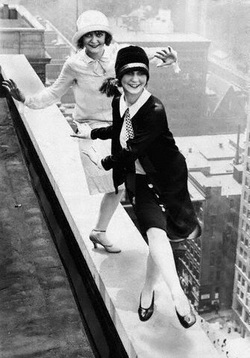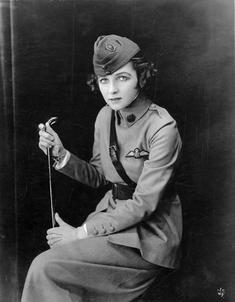Slang

Many new slang words came about in the 1920s. We still use some of these words today!
Attaboy - well done!; also Attagirl!
Bootleg - illegal liquor
Cat's Meow - Something splendid or stylish; similar to bee's knees; The best or greatest, wonderful.
Dolled up - dressed up
Flapper - A stylish, brash, hedonistic young woman with short skirts & shorter hair
Gold Digger - A woman who associates with or marries a man for his wealth
Heebie-Jeebies - The jitters
Joint - A club, usually selling alcohol
Nifty - great, excellent
Owl - a person who's outlate
Pushover - A person easily convinced or seduced
Real McCoy - The genuine article
Spiffy - An elegant appearance
Upchuck - To vomit when one has drunk too much
What's eating you? - What's wrong
You slay me - that's funny
Attaboy - well done!; also Attagirl!
Bootleg - illegal liquor
Cat's Meow - Something splendid or stylish; similar to bee's knees; The best or greatest, wonderful.
Dolled up - dressed up
Flapper - A stylish, brash, hedonistic young woman with short skirts & shorter hair
Gold Digger - A woman who associates with or marries a man for his wealth
Heebie-Jeebies - The jitters
Joint - A club, usually selling alcohol
Nifty - great, excellent
Owl - a person who's outlate
Pushover - A person easily convinced or seduced
Real McCoy - The genuine article
Spiffy - An elegant appearance
Upchuck - To vomit when one has drunk too much
What's eating you? - What's wrong
You slay me - that's funny
Culture Stuff

During this time many people did not have respect for people of color. The Ku Klux Klan was growing as well as Vigilante groups. They often took the law into their own hands by lynching blacks with out trial. The members of the KKK also supported prohibition, traditional morality, and true Americanism. They targeted blacks, Jews, Catholics, and immigrants. After World War I the KKK grew to three million members. The members were very open about being in the KKK. Many were small business owners and farmers, and they supported each other. Most people from the KKK were from the Deep South. As members and leaders started to commit crimes and be caught, the KKK slowly lost members and supporters.
During the 1920s there were 106,521,537 people living in the United States. The unemployment rate was about 5.2%. The average salary for an American was $1236 a year. The illiteracy rate was 6%, which was a new low.
Before the 1920s most women did not work. World War I caused many women to join the war and become nurses. Over 23,000 women entered war time industrial plants. Women built ammunitions and worked with TNT. They were put a risk of TNT poisoning and explosions. After succeeding at male jobs, woman demanded higher wages and more rights. Many people in the 1920 believed that if women were included in politics, the human race would die out because they would stop having babies, getting married, and doing everything normal housewives were supposed to do. This was called "race suicide argument.” In 1920, the 19th amendment was passed and it gave women the right to vote. The 1920s got women more interested in their social life. There were new fashion trends, products, and sexier images. After women gained the right to vote, the idea of what the role of women was changed quite a bit. Women could now do a lot more because they had their own jobs and money and easier access to transportation.
During the 1920s there were 106,521,537 people living in the United States. The unemployment rate was about 5.2%. The average salary for an American was $1236 a year. The illiteracy rate was 6%, which was a new low.
Before the 1920s most women did not work. World War I caused many women to join the war and become nurses. Over 23,000 women entered war time industrial plants. Women built ammunitions and worked with TNT. They were put a risk of TNT poisoning and explosions. After succeeding at male jobs, woman demanded higher wages and more rights. Many people in the 1920 believed that if women were included in politics, the human race would die out because they would stop having babies, getting married, and doing everything normal housewives were supposed to do. This was called "race suicide argument.” In 1920, the 19th amendment was passed and it gave women the right to vote. The 1920s got women more interested in their social life. There were new fashion trends, products, and sexier images. After women gained the right to vote, the idea of what the role of women was changed quite a bit. Women could now do a lot more because they had their own jobs and money and easier access to transportation.
